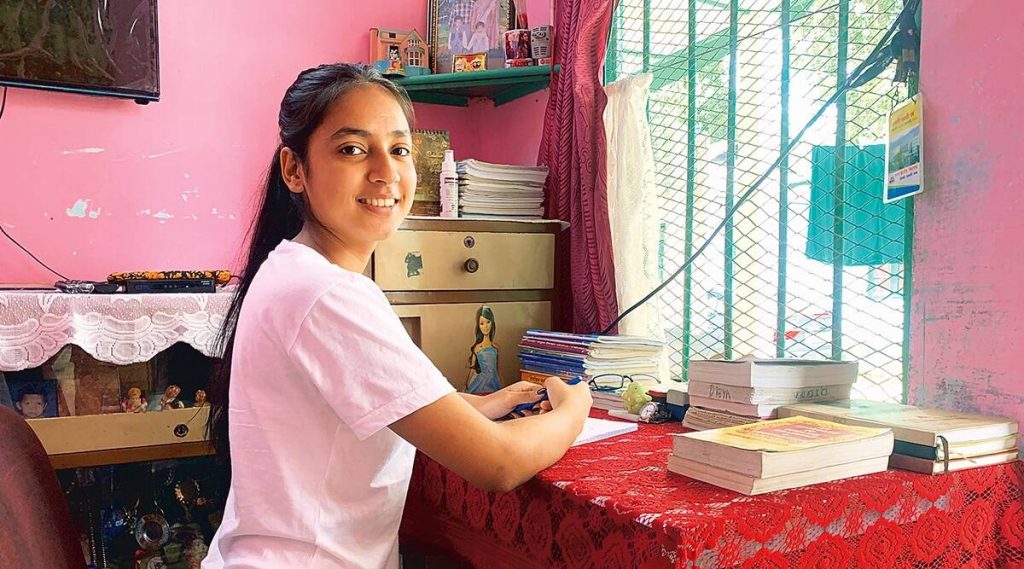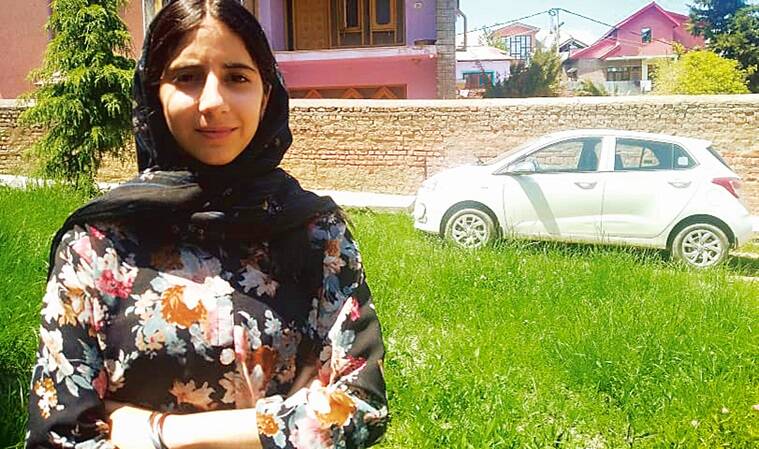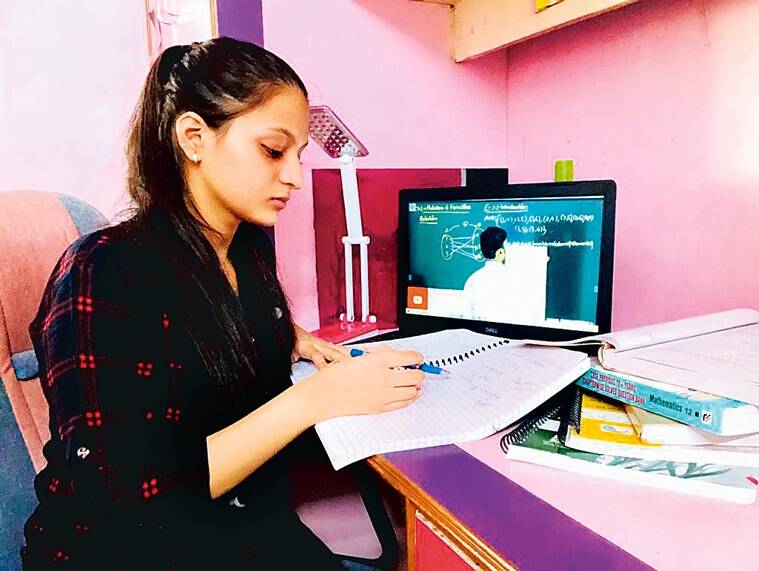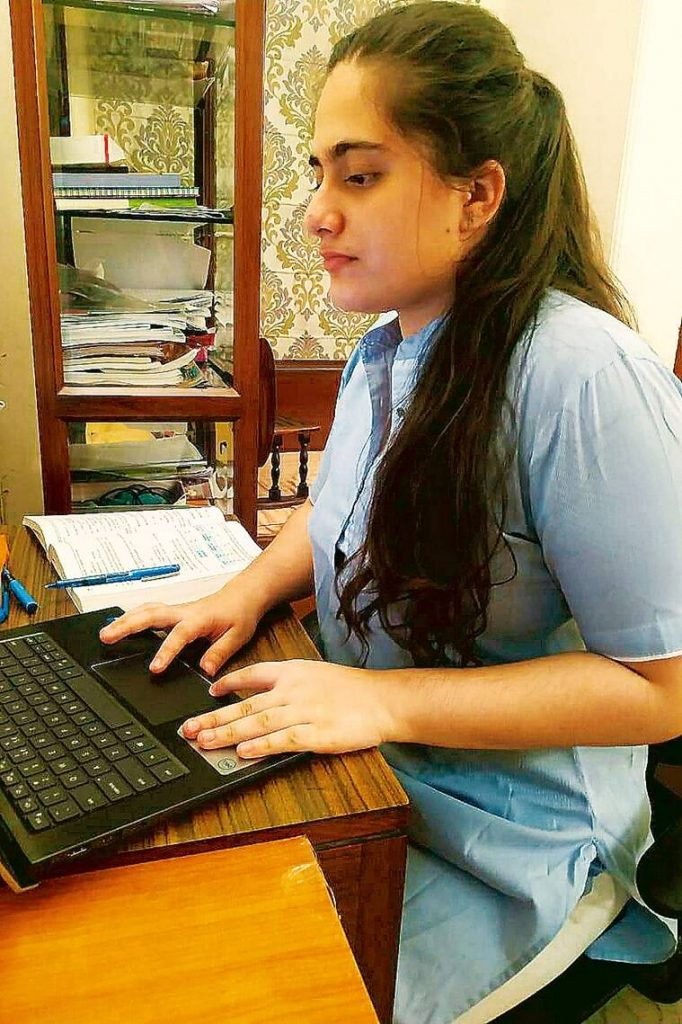LOCKED IN : Students of all ages from KG to the Higher secondary are traumatized over being imprisoned at home for more than a year.
By Tora Agarwala , Naveed Iqbal , Iram Siddique , Sukrita Baruah
The uncertainty over their future academic careers is causing a great deal of anxiety to young people. With both secondary and higher secondary exam cancelled, students keen on admission to professional courses or studying abroad are worried about their future.
It has been this way since April. As the second wave of the pandemic raged, a cloud of uncertainty fell on Daisy’s Board exams, then scheduled for May 11.
In the midst of all the other anxieties in a pandemic year, for Class 12 students across the country, the biggest question staring them in the face is: when will their crucial school-leaving exam be held? And in what form? The Sunday Express brings snapshots of four Class 12 students, across school Boards, as they share their uncertainties, fears and a thought that keeps them going — “at least we are all in it together”.

Dai ita, 18
Tarini Choudhury Govt School,
Guwahati
Every evening, when her father watches the news, Daisy Kalita, a Class 12 student, finds her attention wandering from her books to the TV screen behind, hoping for an update.
It has been this way since April. As the second wave of the pandemic raged, a cloud of uncertainty fell on Daisy’s Board exams, then scheduled for May 11.
Daisy remembers the state Education Minister appearing on TV to say that the decision on Assam Higher Secondary Education Council’s Class 12 exams — the one which Daisy’s school is affiliated to — would be announced only after the election results.
“What has my exam got to do with politics,” the 18-year-old wondered, venting her frustration in a WhatsApp group with her five best friends.
In early May, with a new government in place, the television finally brought some news she could use: the exams were postponed.
And then, last week, the new minister hinted that they may only have to sit for three papers, instead of six. Daisy remembers feeling excited, making a mental note to eliminate Economics, her least favourite subject, from her schedule. But soon, on a show her father was watching, she heard that it was only an “idea” being discussed. “The uncertainty is depressing. Ma tells me to study, but it’s hard to study for an exam which may not even happen, no?,” says Daisy.
These days, Daisy says she studies for a bit, then stops, gets stressed about not studying, and then sends an angry text to her friend: “When will all this be over?”
All this in what Daisy thought would be the most crucial year of her academic life. So far, it’s been a topsy-turvy year — her mother’s phone with its patchy network replacing classrooms; hazy photographs of notes on WhatsApp instead of textbooks; and the chatter of her friends replaced by the lonely hours spent at her desk in one of the two rooms in the house that she shares with her father, an administrative staff worker at a manufacturing company; mother and her elder brother.
There is also the anxiety of the pandemic, which, says Daisy, she could have shared with her best friend or teachers if she were at school.
Daisy’s father Narapati Kalita says the family is not against the state holding Class 12 exams as long as safety protocols are in place.
“Students are stressed, parents are frustrated… we advise them all,” says Tripti Kalpa Hazarika, who teaches English at Daisy’s school. “Most of our students come from lower economic backgrounds. For them, an education and exams mean everything.”
Daisy agrees. “(Class 12) is the certificate that will decide which college I study in and that in turn will decide what job I get,” says Daisy, who wants to work in the “IT sector”. “I initially wanted to join the Army but changed my mind. I like Computer Science and maybe that’s the kind of job that will help me step out of Guwahati, and maybe visit a foreign country too.”
When the pandemic shut down school last year, Daisy admits being excited in the beginning. “Our Class 11 exams were cancelled,” she says.
But soon, as days stretched on endlessly, the break became “unbearable”. “Attending classes online became hard — we are used to big blackboards, and suddenly we were straining our eyes trying to make sense of an image on WhatsApp,” she says.
In October, her school briefly reopened for classes, but when the second wave came, the school shut down, and now her days are sluggish once again. “I wake up at 7 am and start my day … slowly slowly,” says Daisy.
She tries to study till the afternoon, after which she has her lunch and watches a “Hindi or English” movie. Then it’s back to her desk. Bedtime is 10 pm, after watching the news with her father. “So far, they haven’t announced a date for the exam. Maybe they will on tomorrow’s news,” she says.
‘Class 10, 11 were washouts, this year will likely be same’

Seerat Rashid Mantoo, 18
Government Girls Higher Secondary School, Shopian
Every few minutes Seerat Rashid Mantoo fiddles with her phone, checking WhatsApp to see if her teacher has posted the day’s schedule. “Not yet,” she says, putting it away, but not for too long.
Even by Kashmir’s standards, it’s been an unusual two years for Seerat and her classmates.
A Class 12 student of the Government Girls Higher Secondary School in Shopian, Kashmir, Seerat worries that the post-winter-break session has just begun, two months behind its usual schedule, and that she may not have enough time to prepare for the Board examinations later this year.
Her school is affiliated to the J&K Board of School Education that follows a different calendar from that of other Boards in the country, with the school year usually beginning in October and the entire session concluding in November-December of the following year.
“But our Class 11 results, which should have been out by February, were only declared in April, and our Class 12 session has just begun. If exams are going to be held in November, we will need to complete the syllabus by October at least. That’s just five months away,” says Seerat, adding that in Class 11 too, they barely had one month of class in school. “But at least the questions in the exams were based on only 70 per cent of the Class 11 syllabus . I have no clue what it is going to be like this year.” With school shut most of last year, Seerat, who has taken up science subjects, says they have had no practical lessons, and she is anyway struggling to keep up with the theory chapters.
“We barely have two to three hours of online classes a day. We just listen to lectures and take notes. In case someone misses a lecture due to Internet troubles or other issues, there is no way of catching up,” she says.
“Plus, there are always distractions because I use my phone for the classes — sometimes they are incoming calls or messages that pop up,” she complains.
With 4G Internet services restored in Kashmir in February, Internet speed is no longer a problem, says Seerat. Her parents also got a WiFi connection installed to ensure that Seerat and her elder sister, who is pursuing her graduation, are able to study without disruptions.
“I am lucky that way. Many of the students in my class don’t have smartphones or laptops. They are struggling,” she says.
What Seerat worries most about is whether she can appear for her medical entrance examinations.
“I want to sit for NEET, but my Class 10 and 11 were mostly washouts, and I think this grade will pass by in the same manner,” she says, adding that she might even take a gap year before appearing for the Class 12 exams.
The only thing that keeps her going in these uncertain times, she says, is the thought that she is not alone — “all my friends and classmates feel the same way. We are all worried”.
Seerat’s mother Shameema Akhtar says that while the last year and the series of shutdowns have been difficult for everyone in Kashmir, it has been especially hard on students.
“This generation is losing valuable time just sitting at home… It is so difficult for them. Of course, we want them to be safe— that would be any parent’s concern — but we are also worried for their future,” she says.
‘I just want this to end… get out of house, visit friends’

Hansika Singh, 18
St Joseph’s Co-Ed, Bhopal
The month began on a terrible note for Hansika. On May 2, her 72-year-old grandfather died of Covid at a hospital in the city.
“We were shattered. I was also very worried for my mother who was with my nanaji in hospital. Luckily, she didn’t test positive but then my mamaji, got Covid,” says Hansika.
But through all this, there was another worry: her approaching Class 12 CBSE Board exam. “It’s difficult to come to terms with the sudden loss of a family member. And to top it all, we don’t even know when we will have our exams, and in what form,” says Hansika.
The stress of the last few weeks has also left Hansika angry. “What is the need to hold exams in the midst of a pandemic? When students ask for exams to be cancelled, they say it’s because we haven’t studied. How can we study when there is so much going on. If they have to hold exams, it should be online,” says the science student.
But with the Union government veering round to the idea that CBSE exams will be held, even if in a truncated manner and only for 19 major subjects, Hansika says she is now forcing herself to stay focused on preparing for the exams.
In its feedback to the Education Ministry last week, the Madhya Pradesh government had left it to the Centre to take a call on CBSE Class 12 Board exams, but requested that not many changes be made in the pattern of the question paper.
“I try to study in two sessions — from 8 am to 12 pm and then from 5 pm to 11 pm,” she says.
When her school shut last year, Hansika says they immediately moved to online classes, which seemed “fun initially”, but the novelty wore off in no time. “The teachers do their best but it’s hard to clear doubts of so many students virtually,” says Hansika, who hopes to study architecture.
While she appeared for a pre-Board exam in February, Hansika says she and her friends still feel very underprepared. “All of us have doubts, but sometimes, there is no one to turn to. Several of our teachers also got infected,” says Hansika, who even took to Twitter to urge the government to postpone the Board exams.
Her father is a Physics teacher at the same school where she studies, “so Physics is not a problem”, but Hansika is left to deal with Maths and Chemistry on her own.
She is now waiting for the government to take a call. “If government pushes students to take exams, they should be prepared to deal with rising Covid cases and students failing,” she warns, adding, “I just want this to end… get out of house, visit friends.”
When stressed, I video-call friends; want to study in good DU college’

Vrinda Wadhwa, 17
Amity International School, Delhi
Vrinda Wadhwa’s final year of school has been very different from what she had expected. She had been appointed the sports captain right before the pandemic struck, but as a series of lockdowns pushed students out of schools and inside their homes, Vrinda found that her calendar had been wiped clean.
“When I was appointed the sports captain, I had planned so many things — build the school teams, conduct sports day. But I couldn’t do any of that,” says the 17-year-old. “So I conducted meetings to encourage everyone to exercise at home instead of just studying.”
While the pandemic scuttled her extra-curricular plans for schools, her academic life transformed completely as well. Like her peers, as she took her first steps towards online classes, the only thing that made things easier was that she already had her own laptop. The rest, she says, was “very challenging, but I adapted to it with time.”
“Online classes were very different from how we had been studying our entire school lives. It was also new for our teachers. Eventually, I got used to the new routine. I am more tech savvy now than I was a year ago,” says the commerce student who wants to take up economics in college.
As she was adjusting to the new system, things got more uncertain as she intensified her board exam preparations. “At first, we were assuming that the exams would be held in March and so in November I increased my study hours. I had completed my entire syllabus and began revisions. Then on New Year’s Eve, we found out that the exams had been pushed to May. So, I gave myself a week’s break and took up revisions again… That’s what I have continued doing till date,” she says.
While the Centre is yet to take a decision on holding CBSE Class 12 exams, as many as 32 states and Union Territories have supported the Board’s proposal to go ahead with the exam. Delhi is among only four states —Maharashtra, Goa and Andaman & Nicobar are the others — to have categorically opposed pen-and-paper examinations.
As she goes through endless cycles of revisions and the wait for exams gets longer, Vrinda says that the one thought that has pulled her through the last year was knowing that “we are all going through the same thing”.
Every day, she begins studying after breakfast and tries to exercise around four times a week. In the evenings, she helps her family with household chores. “I try to do things which keep me happy, so I try to cook something new at least thrice a week—something Italian or Mexican.”
And on days when the stress gets the better of her, she leans on her friends. “There is a lot of uncertainty and we’re all dealing with anxiety. I want to study in a good Delhi University college so these exams mean a lot. I have four-five close friends, and we speak to each other frequently. We prefer video-calling since we don’t get to see each other otherwise. It helps me calm down,” says Vrinda, who has also been doing online searches to check for updates on her exam dates. She has also reached out to her school counsellors and vice-principal “a few times” to talk about her anxieties and to seek clarifications on dates.
3,07,000 students will be appearing for CBSE Class 12 exams from Delhi this year.
As she continues to prepare for exams that increasingly seem like they will be held in July- August, there is one thing that she hopes for now: “I want a normal college life.”
